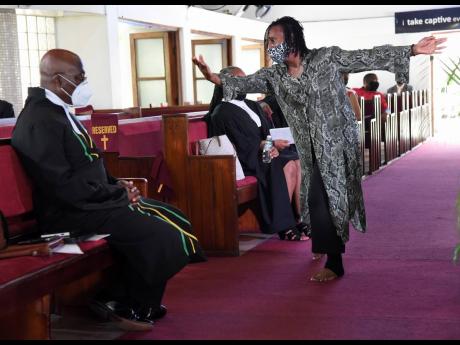COVID forces faster tech transition for courts
Jamaica’s Chief Justice Bryan Sykes sought on Sunday to cast the coronavirus pandemic as not altogether negative, arguing that the wide-scale restrictions on movement and gatherings had fast-tracked the use of technology in judicial proceedings and increased efficiency.
The country’s courts have long been criticised as archaic and resistant to innovation through emerging technology, adding more red tape to a system notorious for its backlogs.
But Sykes said that the COVID-19 crisis had forced the judicial system to transition at a faster pace than imagined.
“Bail applications are still being done in the Supreme Court. The police have established technology at Kingston Central, Half-Way Tree, and Freeport Police Station in Montego Bay,” Sykes said in his address to the congregation at Webster Memorial United Church in St Andrew on Sunday.
“There is currently work going on at all the main stations, so within the next few months, we will be able to have bail applications in the parish courts remotely without persons being brought to court.”
The chief justice was addressing the annual assize service marking the beginning of the Michaelmas term of the High Court.
A number of appeals have been heard electronically in the Supreme Court, a development Sykes described as positive and transformative. He urged the new Holness administration to resolve the long-standing problems with Internet access across the island but said that persons who were not technologically savvy would not be discriminated against.
“We still have to find ways and means of accommodating those persons who do not want the transition to the digital transition to be one of exclusion. The technology is allowing us now to facilitate attorneys from rural Jamaica to begin to develop a practice in the Court of Appeal and the Supreme Court,” he said.
BOLD ROAD MAP
The chief justice had, in March 2019, laid out a bold road map for the Jamaican judiciary to become the best in the Caribbean in three years and among the best in the world in six years.
Sykes promised record delivery of Supreme Court judgments, divorces, and estate claims as part of the country’s First-World ambitions by 2030.
On Sunday, the chief justice pitched broader use of technology as fundamental to the strategic efficiency of parish courts, the Court of Appeal, and the Supreme Court. He called for judges and attorneys to get on board.
“Those of us who are already in the legal system will have to make that adjustment so that when persons are interacting with the courts, they really don’t expect to see a lot of paper. They expect to be able to go online and gain access to legal services,” said Sykes.
The chief justice said that many applications for the parish courts will be accessible online by 2021. Sykes urged lawyers not to feel slighted that the courts were taking money from their pockets, involving divorces and estate matters, by migrating access online.
Sykes disclosed that despite the pandemic and other challenges, 83 per cent of cases in parish courts, some of which dated back to 2016, had been disposed of in less than 12 months.
“Oftentimes, we mention backlog but not the significant improvements made,” he said.
Case backlogs in the Supreme and Gun courts are on track to be cleared by 2021, the chief justice said. By June next year, there should be no cases older than 2019.
“In fact, we are already trying cases that came before the courts in 2020. We hardly have cases that are beyond 2018, going back to 2017,” he said.
Owing to the appointment of three additional judges to the Court of Appeal, Sykes cited 2019 data showing that of the 191 matters heard, 63.35 per cent, or 120, had been disposed of on the same day and another 25 per cent that same week.

